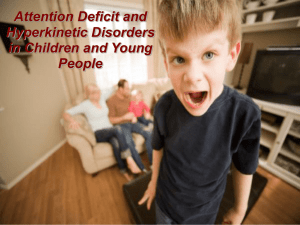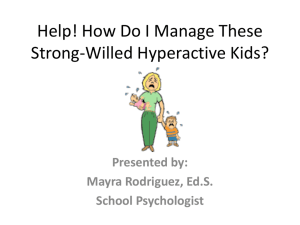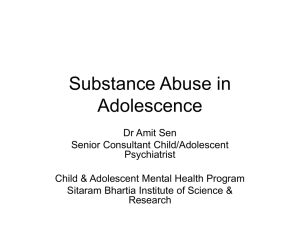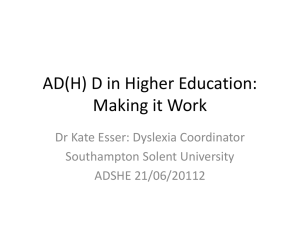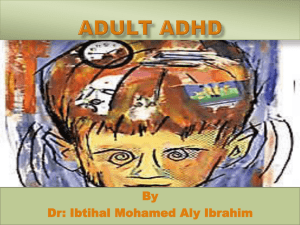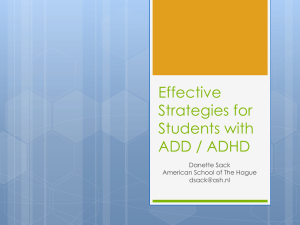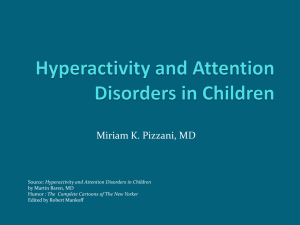Methylphenidate for adults with ADHD
advertisement
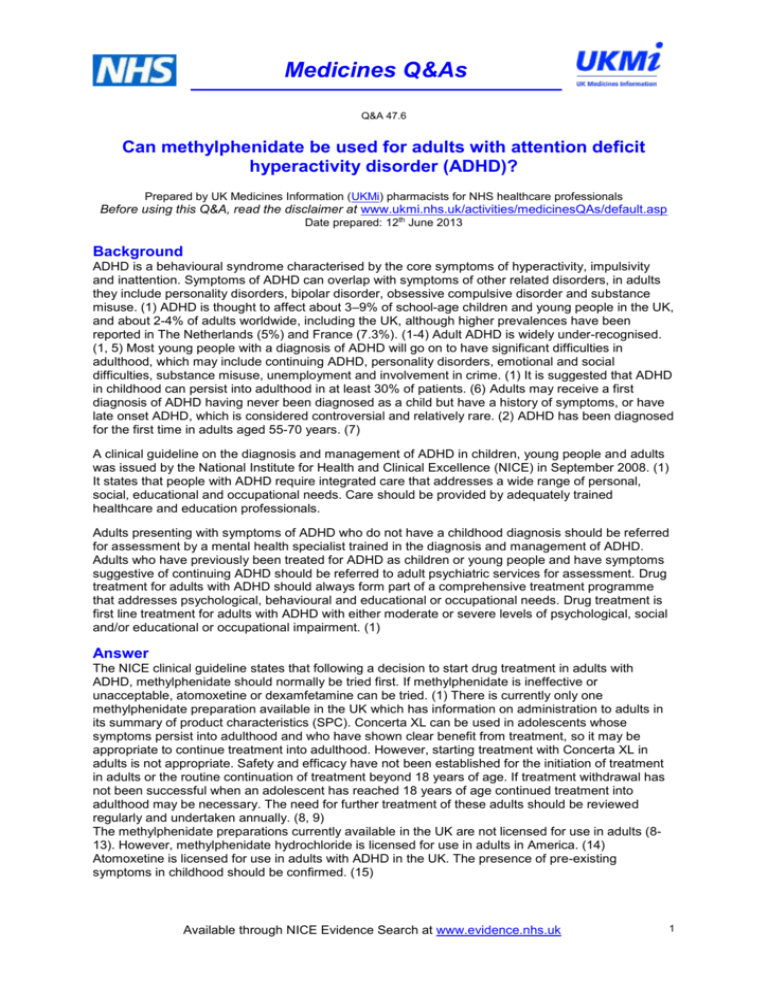
Medicines Q&As Q&A 47.6 Can methylphenidate be used for adults with attention deficit hyperactivity disorder (ADHD)? Prepared by UK Medicines Information (UKMi) pharmacists for NHS healthcare professionals Before using this Q&A, read the disclaimer at www.ukmi.nhs.uk/activities/medicinesQAs/default.asp Date prepared: 12th June 2013 Background ADHD is a behavioural syndrome characterised by the core symptoms of hyperactivity, impulsivity and inattention. Symptoms of ADHD can overlap with symptoms of other related disorders, in adults they include personality disorders, bipolar disorder, obsessive compulsive disorder and substance misuse. (1) ADHD is thought to affect about 3–9% of school-age children and young people in the UK, and about 2-4% of adults worldwide, including the UK, although higher prevalences have been reported in The Netherlands (5%) and France (7.3%). (1-4) Adult ADHD is widely under-recognised. (1, 5) Most young people with a diagnosis of ADHD will go on to have significant difficulties in adulthood, which may include continuing ADHD, personality disorders, emotional and social difficulties, substance misuse, unemployment and involvement in crime. (1) It is suggested that ADHD in childhood can persist into adulthood in at least 30% of patients. (6) Adults may receive a first diagnosis of ADHD having never been diagnosed as a child but have a history of symptoms, or have late onset ADHD, which is considered controversial and relatively rare. (2) ADHD has been diagnosed for the first time in adults aged 55-70 years. (7) A clinical guideline on the diagnosis and management of ADHD in children, young people and adults was issued by the National Institute for Health and Clinical Excellence (NICE) in September 2008. (1) It states that people with ADHD require integrated care that addresses a wide range of personal, social, educational and occupational needs. Care should be provided by adequately trained healthcare and education professionals. Adults presenting with symptoms of ADHD who do not have a childhood diagnosis should be referred for assessment by a mental health specialist trained in the diagnosis and management of ADHD. Adults who have previously been treated for ADHD as children or young people and have symptoms suggestive of continuing ADHD should be referred to adult psychiatric services for assessment. Drug treatment for adults with ADHD should always form part of a comprehensive treatment programme that addresses psychological, behavioural and educational or occupational needs. Drug treatment is first line treatment for adults with ADHD with either moderate or severe levels of psychological, social and/or educational or occupational impairment. (1) Answer The NICE clinical guideline states that following a decision to start drug treatment in adults with ADHD, methylphenidate should normally be tried first. If methylphenidate is ineffective or unacceptable, atomoxetine or dexamfetamine can be tried. (1) There is currently only one methylphenidate preparation available in the UK which has information on administration to adults in its summary of product characteristics (SPC). Concerta XL can be used in adolescents whose symptoms persist into adulthood and who have shown clear benefit from treatment, so it may be appropriate to continue treatment into adulthood. However, starting treatment with Concerta XL in adults is not appropriate. Safety and efficacy have not been established for the initiation of treatment in adults or the routine continuation of treatment beyond 18 years of age. If treatment withdrawal has not been successful when an adolescent has reached 18 years of age continued treatment into adulthood may be necessary. The need for further treatment of these adults should be reviewed regularly and undertaken annually. (8, 9) The methylphenidate preparations currently available in the UK are not licensed for use in adults (813). However, methylphenidate hydrochloride is licensed for use in adults in America. (14) Atomoxetine is licensed for use in adults with ADHD in the UK. The presence of pre-existing symptoms in childhood should be confirmed. (15) Available through NICE Evidence Search at www.evidence.nhs.uk 1 Medicines Q&As The NICE guideline development group (GDG) identified a number of studies published between 1976 and 2007 that assessed the efficacy and safety of pharmacological treatments for ADHD. However, a large majority were excluded as they lacked validated outcome measures. (16) The use of methylphenidate in adults is based on the results of 3 studies – see table 1. The NICE GDG summarised that in adults with ADHD, high dose methylphenidate showed evidence of a reduction in ADHD symptoms as rated by an investigator but a small effect of improvement in medium doses as measured from self-reports. There was also evidence of global clinical improvement when compared with placebo. (16) Only one RCT (17) assessed side effects and indicated that high dose methylphenidate is more likely than placebo to cause particular side effects: decreased appetite, gastrointestinal problems, tension, cardiovascular complaints, depression, dizziness, anxiety, autonomic symptoms, increased energy, tics, skin problems, bruising and sexual problems. Methylphenidate may reduce the risk of discontinuation when compared with placebo. Long-term studies of side effects in adults are scarce. Safety reviews have indicated an association between the use of methylphenidate and sudden death, however, given the lack of background rates the evidence is inconclusive. The GDG concluded that methylphenidate is effective in reducing ADHD core symptoms and in producing clinical improvement as rated by investigators in adults with ADHD and high dose methylphenidate may increase side effects. (16) Table 1 - Efficacy results from double blind, placebo controlled studies in adults with ADHD Ref no. 17 18 19 Study details Methylphenidate preparation 36mg SR tablet [osmotic release oral system] Mean daily dose 80.9 31.8mg 146 adults R, DB, PC, PD 6 weeks duration 5mg & 10mg IR capsules 82 ± 22mg 45 adults R, DB, PC, CO 6 weeks duration 10mg IR tablets 149 adults R, DB, PC 6 weeks duration (0.99 ± 0.32 mg/kg) (1.1 ± 0.24 mg/kg) Mean total daily dose not stated (0.91mg/kg, range 0.541.04 mg/kg) Results at study endpoint 66% methylphenidate vs. 39% placebo subjects reported much or very much improved on the CGI Improvement scale and a >30% reduction in ADHD symptoms on AISRS (p<0.001). 68% methylphenidate vs. 17% placebo subjects reported much or very much improved on the CGI Improvement scale and a >30% reduction in ADHD symptoms on AISRS (p<0.0001). 38% methylphenidate vs. 7% placebo subjects had a decrease of at least 2 points on the CGIADHD and a >30% symptom reduction measured by the DSMIV ADHD rating scale (p=0.003). Key: R = randomised, DB = double blind, PC = placebo controlled, CO = cross over, PD = parallel design, SR = sustained release, IR = immediate release, CGI-ADHD = Clinical Global Impression scale for ADHD (investigator assessment), AISRS = Adult ADHD Investigator System Report Scale, DSM-IV ADHD = Diagnostic and Statistical Manual of Mental Disorders 4th edition ADHD rating scale (patient self assessment) A comparison of the acute efficacy and tolerability of the 2 different methylphenidate preparations used in the Biederman et al (17) and Spencer et al (18) studies concluded that once daily doses of SR methylphenidate had similar efficacy to three times daily doses of IR methylphenidate. (20) Since the NICE clinical guideline publication, a number of papers have reviewed and assessed the efficacy, tolerability and long term use of immediate release and sustained release methylphenidate in adults with ADHD. The studies demonstrate efficacy for both methylphenidate formulations and indicate that use of methylphenidate results in statistically significant improvement of ADHD symptoms according to various rating scales. (21-28) A meta-regression analysis of the efficacy of methylphenidate for adults with ADHD showed an improvement in symptoms in a dose dependent Available through NICE Evidence Search at www.evidence.nhs.uk 2 Medicines Q&As fashion. The efficacy of methylphenidate appears to be reduced in patients with comorbid substance use disorders. It is unclear if methylphenidate efficacy is influenced by type of formulation. (29) The studies included in the NICE clinical guideline were only 6 weeks duration, other studies have been conducted from 24 weeks to more than 4 years. (21-27) A naturalistic follow up study showed that treatment of ADHD in adults for more than 2 years was associated with better functioning than treatment for 2 years or less. Comorbidity at baseline predicted poorer outcome. (26) All the studies showed quite high rates of discontinuation of methylphenidate, some over 50%. In many cases, discontinuation was due to adverse effects or lack of efficacy due to the low doses used in the studies. (21-27) There is a positive correlation between dropout rate and the dose of methylphenidate. (28) Post-hoc analysis of a randomised, double blind, placebo controlled trial with SR methylphenidate 54mg and 72mg suggest that women, newly diagnosed patients, patients with a substance use disorder and subjects with high educational degrees seem to have a higher risk of non-adherence and therefore a reduction in improvement in symptoms. (30) Cardiovascular adverse effects have been noted in the clinical trials, for example, a mean increase in pulse rate of 4.8 beats per minute (21, 28), increased heart rate (23, 25), mean increases of 2.8mmHg and 2.7mmHg for systolic and diastolic blood pressure (25, 28) and tachycardia (25). A retrospective, population based cohort study in adults with ADHD aged 25-64 years showed that current or new use of ADHD medications, including methylphenidate, was not associated with an increased risk of serious cardiovascular events such as myocardial infarction, sudden cardiac death and stroke. (31, 32) A non-randomised cohort study focussing specifically on methylphenidate and serious cardiovascular events in adults concluded that although initiation of methylphenidate was associated with a 1.8 fold increase in risk of sudden death or ventricular arrhythmia, there is a lack of dose response which suggests the association may not be causal. (33) Summary NICE clinical guidelines on the diagnosis and management of ADHD in children, young people and adults state that following a decision to start drug treatment in adults with ADHD, methylphenidate should normally be tried first. Methylphenidate preparations currently available in the UK are not licensed for use in adults. The SPC for Concerta XL says it can be used in adolescents whose symptoms persist into adulthood and who have shown clear benefit from treatment, so it may be appropriate to continue treatment into adulthood. However, starting treatment with Concerta XL in adults is not appropriate. Methylphenidate is effective in reducing ADHD core symptoms and in producing clinical improvement in adults with ADHD when assessed against investigator rating scales. Improvement in symptoms is dose dependent and sustained release and immediate release methylphenidate preparations have similar efficacy in adults. A naturalistic follow up study showed that treatment of ADHD in adults for more than 2 years was associated with better functioning than treatment for 2 years or less. Co-morbidity at baseline is a predicter of poorer outcome. There is a positive correlation between dropout rate and the dose of methylphenidate. Women, newly diagnosed patients, patients with a substance use disorder and subjects with high educational degrees seem to have a higher risk of non-adherence. Large cohort studies have shown that current or new use of ADHD medications, including methylphenidate, is not associated with an increased risk of serious cardiovascular events such as myocardial infarction, sudden cardiac death and stroke. Initiation of methylphenidate is associated with a 1.8 fold increase in risk of sudden death or ventricular arrhythmia, although there is a lack of dose response which suggests the association may not be causal. Limitations This question has only examined the use of methylphenidate for treatment of adults with ADHD. Other stimulants have also been studied e.g. dexamphetamine, atomoxetine. Non-stimulants that may provide a response include bupropion, monoamine oxidase inhibitors, lithium and venlafaxine. (2) Available through NICE Evidence Search at www.evidence.nhs.uk 3 Medicines Q&As References 1. NICE Clinical Guideline 72. Attention deficit hyperactivity disorder: diagnosis and management of ADHD in children, young people and adults. Issued September 2008, last modified March 2013. Accessed via http://www.nice.org.uk on 29/05/13. 2. Bazire S. Psychotropic Drug Directory 2012. HealthComm UK Ltd. 2012 p34-37 3. McCarthy S, Wilton L et al. The epidemiology of pharmacologically treated attention deficit hyperactivity disorder (ADHD) in children, adolescents and adults in UK primary care. BMC Paediatrics 2012; 12: 78 http://www.biomedcentral.com/1471-2431/12/78 4. Brod M, Pohlman B et al. Comparison of the burden of illness for adults with ADHD across seven countries: a qualitative study. Health and Quality of Life Outcomes 2012; 10: 47 http://www.hqlo.com/content/10/1/47 5. Anon. Adults with ADHD: ignored and under-treated. Drug and Therapeutics Bulletin 2011; 49 (7): 73 6. Post RE, Kurlansik SL. Diagnosis and management of Attention-Deficit/Hyperactivity Disorder in adults. American Family Physician 2012; 85 (9): 890-6 7. Manor I; Rozen S; et al. When does it end? Attention-deficit/hyperactivity disorder in the middle aged and older populations. Clinical Neuropharmacology 2011; 34 (4): 148-54. 8. Summary of Product Characteristics - Concerta XL 18mg-36mg prolonged-release tablets. Janssen-Cilag Ltd. Accessed via http://emc.medicines.org.uk on 29/05/13 [last revised 18/02/13]. 9. Summary of Product Characteristics - Concerta XL 27mg prolonged-release tablets. JanssenCilag Ltd. Accessed via http://emc.medicines.org.uk on 29/05/13 [last revised 18/02/13]. 10. Summary of Product Characteristics - Equasym XL 10mg, 20mg & 30mg capsules. Shire Pharmaceuticals Ltd. Accessed via http://emc.medicines.org.uk on 29/05/13 [last revised 11/10/11]. 11. Summary of Product Characteristics - Ritalin tablets. Novartis Pharmaceuticals UK Ltd. Accessed via http://emc.medicines.org.uk on 29/05/13 [last revised 13 June 2011]. 12. Summary of Product Characteristics - Medikinet tablets. Flynn Pharma Ltd. Accessed via http://emc.medicines.org.uk on 29/05/13 [last revised 21/12/11]. 13. Summary of Product Characteristics - Medikinet XL prolonged-release capsules. Flynn Pharma Ltd. Accessed via http://emc.medicines.org.uk on 29/05/13 [last revised 21/12/11]. 14. DRUGDEX® Drug Evaluation – methylphenidate. DRUGDEX electronic version, Thomson Micromedex, USA. Accessed via http://www.thomsonhc.com on 07/06/13. 15. Summary of Product Characteristics – Strattera 10mg, 18mg, 25mg, 40mg, 60mg, 80mg or 100mg hard capsules. Eli Lilly and Company Ltd. Accessed via http://emc.medicines.org.uk on 02/07/13 [last revised 28/05/13]. 16. National Collaborating Centre for Mental Health. ADHD. Diagnosis and management of ADHD in children, young people and adults. The British Psychological Society and The Royal College of Psychiatrists, 2009. Accessed via http://www.nice.org.uk on 07/06/13. 17. Biederman J, Mick E et al. A randomised, placebo-controlled trial of OROS methylphenidate in adults with attention-deficit/hyperactivity disorder. Biological Psychiatry 2006; 59: 829-35. 18. Spencer T, Biederman J et al. A large, double-blind, randomised clinical trial of methylphenidate in the treatment of adults with attention-deficit/hyperactivity disorder. Biological Psychiatry 2005; 57: 456-63. 19. Kooij JJS, Burger H et al. Efficacy and safety of methylphenidate in 45 adults with attentiondeficit/hyperactivity disorder. A randomised placebo-controlled double-blind cross-over trial. Psychological Medicine 2004; 34: 973-82. 20. Biederman J, Mick EO et al. Comparative acute efficacy and tolerability of OROS and immediate release formulations of methylphenidate in the treatment of adults with attentiondeficit/hyperactivity disorder. BMC Psychiatry 2007; 7: 49. 21. Rosler M, Fischer R et al. A randomised, placebo-controlled, 24 week study of low dose extended-release methylphenidate in adults with attention-deficit/hyperactivity disorder. European Archives of Psychiatry and Clinical Neuroscience 2009; 259 (2): 120-9. 22. Biederman J, Mick E et al. A randomized, 3-phase, 34-week, double blind, long term efficacy study of osmotic-release oral system-methylphenidate in adults with attention-deficit/hyperactivity disorder. Journal of Clinical Psychopharmacology 2010; 30 (5): 549-53. 23. Bejerot S, Ryden E et al. Two-year outcome of treatment with central stimulant medication in adult attention-deficit/hyperactivity disorder: a prospective study. Journal of Clinical Psychiatry 2010; 71 (12): 1590-7. Available through NICE Evidence Search at www.evidence.nhs.uk 4 Medicines Q&As 24. Wender PH, Reimherr FW et al. A one year trial of methylphenidate in the treatment of ADHD. Journal of Attention Disorders 2011; 15 (1): 36-45. 25. Adler LA, Orman C et al. Long-term safety of OROS methylphenidate in adults with attentiondeficit/hyperactivity disorder. An open-label, dose-titration, 1 year study. Journal of Clinical Psychopharmacology 2011; 31: 108-114. 26. Lensing MB, Zeiner P et al. Four year outcome in psychopharmacologically treated adults with attention-deficit/hyperactivity disorder: a questionnaire survey. Journal of Clinical Psychiatry 2013; 74 (1): e87-93 27. Buitelaar JK, Trott G-E et al. Long term efficacy and safety outcomes with OROS-MPH in adults with ADHD. International Journal of Neuropsychopharmacology 2012; 15: 1-13. 28. Santosh PJ, Sattar S et al. Efficacy and tolerability of pharmacotherapies for attention-deficit hyperactivity disorder in adults. CNS Drugs 2011; 25 (9): 737-63 29. Castells X, Ramos-Quiroga JA et al. Efficacy of methylphenidate for adults with attention-deficit hyperactivity disorder. A meta-regression analysis. CNS Drugs 2011; 25 (2): 157-69 30. Kooji JJS, Rosler M et al. Predictors and impact of non-adherence in adults with attentiondeficit/hyperactivity disorder receiving OROS methylphenidate: results from a randomized, placebo-controlled trial. BMC Psychiatry 2013;13:36 http://www.biomedcentral.com/1471-244X/13/36 31. Habel LA, Cooper WO et al. ADHD medications and risk of serious coronary heart disease in young and middle-aged adults. Effective Health Care Program Research Reports, no. 36, December 2011. 32. Habel LA, Cooper WO et al. ADHD medications and risk of serious coronary heart disease in young and middle-aged adults. Journal of the American Medical Association 2011; 306 (24): 2673-83 33. Schelleman H, Bilker WB et al. Methylphenidate and risk of serious cardiovascular events in adults. American Journal of Psychiatry 2012; 169: 178-85 Quality Assurance Prepared by Katie Smith, East Anglia Medicines Information Service Date Prepared 12th June 2013 (partial update 2 July 2013) Checked by Sarah Cavanagh, East Anglia Medicines Information Service Date of check 25th June 2013 (partial update 2 July 2013) Search strategy Embase: [[ATTENTION DEFICIT DISORDER/ AND ADULT/] AND METHYLPHENIDATE] [Limit to: Publication Year 2011-2013 and Human and (Human Age Groups Adult 18 to 64 years) and English Language and (Clinical Trials Clinical Trial)] Medline: [ATTENTION DEFICIT DISORDER WITH HYPERACTIVITY/ AND ADULT/] AND METHYLPHENIDATE/ [Limit to: Publication Year 20011-2013 and (Publication Types Clinical Trial, All) and Humans and (Age Groups All Adult 19 plus years) and English Language] In-house database/resources: search terms = methylphenidate, hyperkinetic syndrome, adult Electronic Medicines Compendium: search term = methylphenidate, adults, ADHD NICE Evidence: search terms = methylphenidate + adult + hyperkinetic syndrome DrugDex methylphenidate drug evaluation: ADHD, adults IDIS: "METHYLPHENIDATE 28200009" and "SYN-HYPERKINETIC, CHILDHOOD 314." and "CASE REPORT ADULT 0" or "STUDY ADULT 3" or "REVIEW ADULT 6" or "REPORT ADULT 7" or "STUDY RANDOMIZE ADULT 135" or "STUDY COHORT ADULT 138" or "STUDY CASECONT ADULT 141" Years: 2011-2013 Available through NICE Evidence Search at www.evidence.nhs.uk 5
